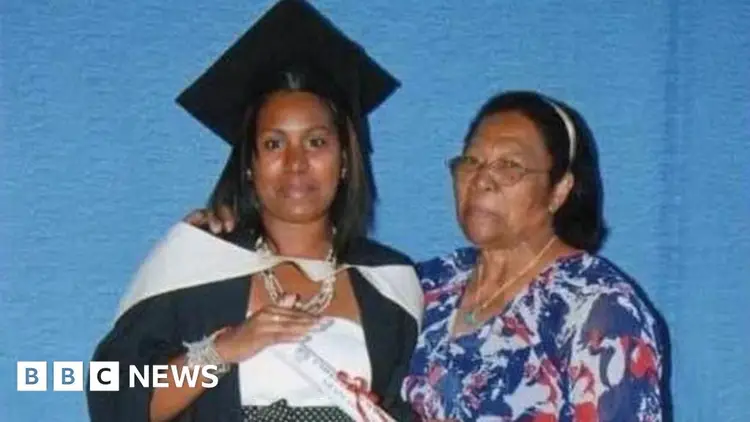UK deal to hand over Chagos Islands criticised over lack of say for Chagossians

Photo credit: Pascalina Nellan
Pascalina Nellan with her grandmother, who was one of the Chagossians displaced from the Chagos Islands around 50 years ago.
Individuals with ties to the Chagos Islands have expressed their dissatisfaction with what they see as being left out of discussions regarding the UK government's agreement to relinquish control over the area.
The isolated yet strategically significant group of islands in the Indian Ocean is about to be transferred to Mauritius after over fifty years.
Several Chagossians interviewed by the BBC expressed their general approval of the agreement, but a considerable number mentioned that native people had consistently been denied the chance to participate in discussions.
The Foreign Office stated that the needs of the Chagossian community have played a significant role in the discussions.
Pascalina Nellan, whose grandmother originated from the important island of Diego Garcia in the area, described the agreement as a betrayal by the UK government.
Ms. Nellan was born in Mauritius, a place her grandmother moved to after being displaced from Diego Garcia to accommodate the establishment of a US Air Force base.
Two years ago, she relocated to the UK, where she has been advocating for the inclusion of Chagossians in discussions regarding the territory.
"Whenever we asked to have our voices heard, we were left out," she stated, alleging that UK officials claimed the Chagossian community was not permitted to take part in the discussions between the two nations.
"Once more, we find ourselves left out," the 34-year-old graduate student shared with the BBC.
"We must honor the rights of Indigenous communities."
Ms. Nellan expressed her desire to return to the islands, but not while they are governed by Mauritius.
"Today, we have lost our right to choose for ourselves—whether we want to be citizens of Britain or Mauritius," she stated.
Frankie Bontemps, a second-generation Chagossian living in the UK, expressed to the BBC on Thursday that he felt "betrayed" and "angry" because he believes "Chagossians have never been included" in the talks.
He expressed that we still have no control or say over shaping our own future and advocated for the complete involvement of Chagossians in the creation of the treaty.
Source of the image, Steeve Bancal
Steeve Bancal embarked on a journey to Diego Garcia, which was arranged by the Foreign Office.
Steeve Bancal, a student social worker from Sussex, had a positive outlook on the agreement.
He mentioned that Mauritius was more inclined to implement resettlement plans for Chagossians compared to the UK, which he claimed had taken "no action" to support the community.
He shared his wish to go back to the islands with his mother, who had also been taken away from Diego Garcia. She settled in Mauritius, which is where Mr. Bancal was born.
Mr. Bancal expressed that it would be a "dream realized" for his 74-year-old mother to go back to Diego Garcia.
Nonetheless, he also expressed discontent with the negotiations, highlighting that they took place "out of public view."
"We weren't informed about what was going on. It's not right for us," he stated.
"It’s a part of our legacy – we ought to have had a couple of individuals present in the space."
"I get the impression that the UK government lacks trust in us."
Image credit: Isabelle Charlot
Isabelle Charlot serves as the leader of the Chagos Islanders Movement.
Isabelle Charlot was born in Mauritius to parents from Chagos and has spent the last 19 years living in the UK, where she serves as the chair of the Chagos Islanders Movement.
She expressed her desire to go back to the archipelago, from which over 1,000 islanders were forcibly taken by Britain between 1965 and 1973 after they took control of the area.
"My family and I have been looking forward to that," Ms. Charlot shared with the BBC.
She expressed her approval of the agreement as a meaningful move towards "restoring [her] sense of self, cultural background, and homeland," all of which she feels have been taken away from her.
"I was aware that the Labour government would aim to address past injustices and uphold international law," she stated.
Human Rights Watch (HRW) urged that the Chagossian community be involved in discussions regarding the agreement.
In reaction to the UK government's recent announcement, Clive Baldwin, a senior legal advisor at Human Rights Watch, stated: "This does not ensure that the Chagossians can go back to their homeland; it seems to clearly prohibit them from returning to Diego Garcia, the largest island, for another hundred years. Additionally, it fails to address the compensation they are rightfully owed to help secure a better future."
Mr. Baldwin urged for substantial discussions with the Chagossian community.
He stated that if this situation doesn’t change, the UK, US, and now Mauritius would be accountable for "an ongoing act of colonial injustice."
Diego Garcia serves as a military installation for the US government, hosting naval vessels and long-range bomber planes.
Jonathan Powell, the UK's Special Envoy for negotiations regarding the British Indian Ocean Territory, expressed on Thursday that the way Britain has historically treated the Chagossians is "disgraceful."
However, he described the deal, which was finalized after 11 rounds of discussions, as "truly significant."
He mentioned that he couldn't assure whether Chagossians would be allowed to go back to the islands, as they would be considered part of Mauritian territory. However, he stated that the UK is dedicated to "assisting with resettlement if it's feasible."
The UK government announced that it will offer a financial support package to Mauritius, which will include yearly payments and investments in infrastructure.
A representative from the FCDO stated, "This is an agreement between the UK and Mauritius."
"We understand that the future of the islands matters greatly to the Chagossian community. Their needs and concerns have played a significant role in the discussions."





















































